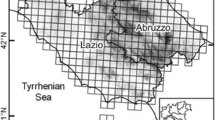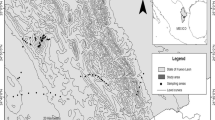Abstract
In phytosociology the plant species is generally considered the basic unit in the characterisation of phytosociological units. In the Braun-Blanquet school this principle has been elaborated most explicitly. The species is the type of attribute with which the vegetation is described, typified, and interpreted. The basis for this procedure is empirical: it is the well-known fact that no two species are alike in their distribution and ecological behaviour. We are all acquainted with the relationship between the morphological and the ecological uniqueness of the species.
Access this chapter
Tax calculation will be finalised at checkout
Purchases are for personal use only
Preview
Unable to display preview. Download preview PDF.
Similar content being viewed by others
Literatur
Beeftink, W. G.: De Zoutvegetatie van Zw-Nederland in Europees verband. — Thesis Wageningen 1965. 167 pp.
Braun-Blanquet, J.: Pflanzensoziologie. 3. Ed. — Wien 1964. Springer. 865 pp.
Bray, J. R. & Curtis, J. T.: An ordination of the upland forest communities of southern Wisconsin. — Ecol. Monogr. 27: 325#x2013;349. 1957.
Chapman, V. J.: Problems in ecological terminology. — Rep. Austr. N. Z. Ass. Adv. Sci. 29: 259#x2013;270. 1952.
Gittins, R.: Multivariate approaches to a limestone grassland community. I. A stand ordination. — J. Ecol. 53: 385#x2013;401. 1965.
Goodall, D. W. The continuum and the individualistic association. — Vegetatio 11: 297#x2013;316. 1963.
Loucks, O. L.: Ordinating forest communities by means of environmental scalars and phytosociological indices. — Ecol. Monogr. 32: 137#x2013;166. 1962.
Maarel, E. Van Der: On the use of ordination models in phytosociology. — Vegetatio 19: 21#x2013;46. 1969.
Miyawaki, A. & Tüxen, J.: Über Lemnetea-Gesellschaften in Europa und Japan. — Mitt. flor.-soz. Arbeitsgem. N.F. 8: 127#x2013;135. 1960.
Müller, Th.: Die Saumgesellschaften der Klasse Trifolio-Geranietea sanguinei. — Mitt. flor.-soz. Arbeitsgem. N.F. 9: 95#x2013;140. 1962.
Orloci, L.: Geometric models in ecology. I. The theory and application of some ordination methods. — J. Ecol. 54: 193#x2013;215. 1966.
Van den Berghen, C.: Etude sur la végétation des dunes et des landes de la Bretagne. — Vegetatio 8: 193#x2013;208. 1958.
Editor information
Rights and permissions
Copyright information
© 1972 Springer Science+Business Media Dordrecht
About this chapter
Cite this chapter
van der Maarel, E. (1972). Ordination of Plant Communities on the Basis of Their Plant Genus, Family and Order Relationships. In: Tüxen, R., van der Maarel, E. (eds) Grundfragen und Methoden in der Pflanzensoziologie / Basic Problems and Methods in Phytosociology. Bericht Über das Internationale Symposion der Internationalen Vereinigung für Vegetationskunde 1970 in Rinteln, vol 14. Springer, Dordrecht. https://doi.org/10.1007/978-94-015-7241-5_13
Download citation
DOI: https://doi.org/10.1007/978-94-015-7241-5_13
Publisher Name: Springer, Dordrecht
Print ISBN: 978-94-015-7242-2
Online ISBN: 978-94-015-7241-5
eBook Packages: Springer Book Archive




